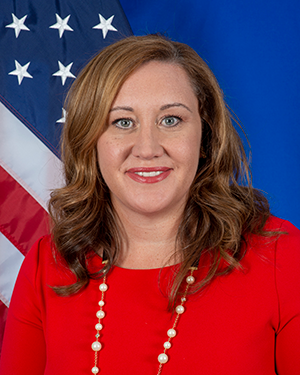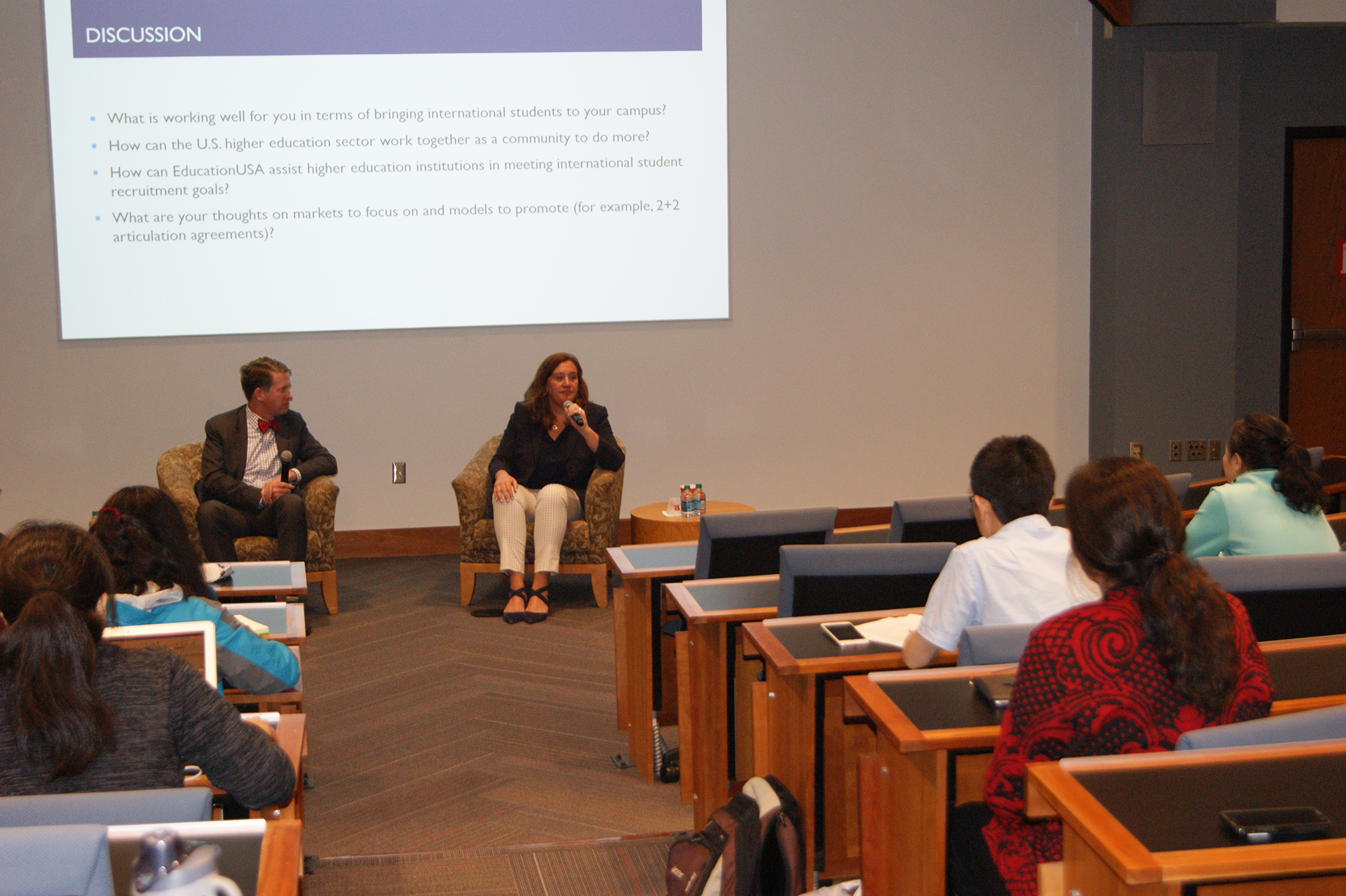On April 15, Rutgers University welcomed Caroline Casagrande, Deputy Assistant Secretary for Academic Programs in the Bureau of Educational and Cultural Exchanges (ECA) at the U.S. Department of State, to campus as part of Rutgers Global Visions and Voices series. Ms. Casagrande was thrilled to be back at Rutgers, as she received her J.D. degree from Rutgers School of Law in Camden, and has also been an honorary fellow of Rutgers University’s Eagleton Institute of Politics since 2015. After an introduction by Barbara Lee, senior vice president for Academic Affairs at Rutgers, Ms. Casagrande spoke on a topic of great importance to many institutions of higher learning in the current geopolitical environment: how to effectively promote the United States as the premiere higher education destination for international students.
Ms. Casagrande began her presentation by announcing that, according to the 2018 Open Doors report administered by the Institute of International Education (IIE), the number of international students in the United States surpassed one million for the third consecutive year, increasing by 1.5 percent to reach a new high of 1,094,792. However, the report also noted that while overall numbers of international students increased, new student enrollments fell by 6.6 percent in 2017-18, continuing a slowing or downward trend first observed in the 2015-16 academic year.
One reason for the slowdown, she explained, is the considerable global competition f rom countries including Australia, India, and the United Kingdom, where significant resources have been devoted to attracting and retaining international students. In addition, the cost of comparable programs in other countries is often lower than in the U.S.
rom countries including Australia, India, and the United Kingdom, where significant resources have been devoted to attracting and retaining international students. In addition, the cost of comparable programs in other countries is often lower than in the U.S.
Since the U.S. currently has no nationalized spending plan to promote higher education to international students, Ms. Casagrande said that it is crucial for the universities to use all available resources, including strategic partnerships with the State Department, to continue to be competitive about recruiting, educating and retaining the best and brightest minds from all over the world.
Ms. Casagrande spoke about her work with the State Department, and how international education is very much viewed as a priority. Through a wide range of programs, including Fulbright Scholarships, Humphrey Fellowships, Gilman Scholarships, undergraduate exchanges and teacher exchanges, and the Mandela Washington Fellowship (with which Rutgers has been a key partner for six consecutive years), Ms. Casagrande and her office are committed to the promotion of U.S. higher education overseas, as well as study abroad for Americans, and English and foreign language study programs.
She spoke about the Fulbright Program, in particular, which offers international exchange opportunities to students and scholars of all backgrounds, helping to internationalize U.S. institutions while building mutual understanding between the U.S. and more than 155 partner countries.
Another program Ms. Casagrande highlighted was EducationUSA, the global network of more than 435 international student advising centers in 178 countries. The network promotes U.S. higher education to students around the world by offering comprehensive and current information about opportunities to study in the United States. By providing a cadre of reputable recruitment professionals throughout the world, EducationUSA can be a trusted and reliable partner and promoter of U.S. colleges and universities
Finally, Ms. Casagrande spoke of the importance of building and maintaining strong international alumni networks, as well as promoting opportunities for on-campus employment and professional practical training. Perhaps most crucially, universities should emphasize their commitment to ensuring that international students feel welcome by highlighting opportunities for experiencing American culture, focusing on safety concerns, and illuminating the many resources available to students.
Ms. Casagrande pointed out that the U.S. still holds a competitive advantage and remains a top destination for international students. She added that the U.S. has significant capacity to host even more international students (70% of international students study at only 300 institutions across the country), and that there is a price point for every student.
After Ms. Casagrande’s presentation, she was joined by Maxmillian Angerholzer III, Executive Vice President of the IIE, the world’s premier non-profit global education organization whose mission is to advance scholarship, build economies, promote greater cultural understanding, and protect scholars and students at risk. Mr. Angerholzer spoke about IIE, which partners with a range of institutions on more than 200 educational and leadership programs, including with the ECA on the Fulbright and other programs. In addition, Mr. Angelholzer and Ms. Casagrande spoke further about the most recent Open Doors report and the data it provided. The Open Doors report is also a partnership between IIE and the ECA, and is a comprehensive information resource on international students and scholars studying or teaching at higher education institutions in the United States, and U.S. students studying abroad for academic credit at their home colleges or universities. Mr. Angerholzer and Ms. Casagrande commenced a Q&A and lively discussion with the audience about other ways to work together to bring international students to Rutgers.
Rutgers was honored to host this event, as the topic is an important one for a university that hosts 10,000 international students, scholars, and faculty. Research shows that international student mobility has historically been a critically important contributor to American leadership in areas such as research and innovation, economic prosperity, and global diplomacy. Ms. Casagrande’s commitment to visiting colleges and universities throughout the nation attests to her interest in continuing to be innovative about internationalization efforts.
For more information, visit www.educationusa.state.gov.

